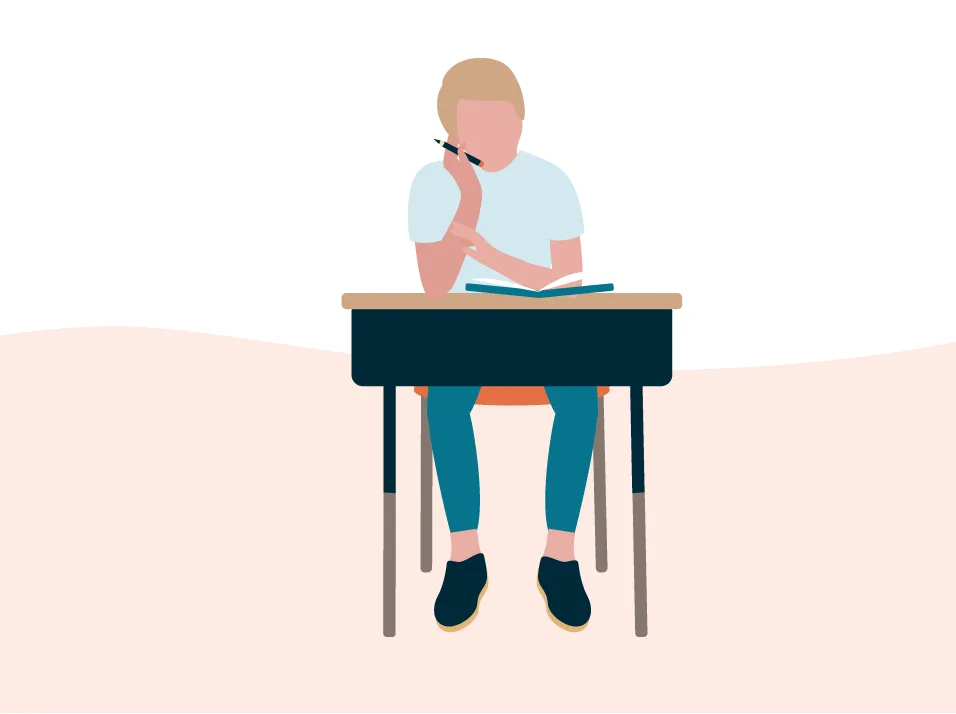A day in the life of a child with dyslexia

Meet Henry, an eighth grader with dyslexia. He’s a smart kid, but his trouble with reading affects almost every aspect of his day. To see how dyslexia can impact kids, take a look at a typical day in Henry’s life.

6:15 a.m.
Henry turns off the alarm, but he doesn’t want to get out of bed. After years of being stared at and overhearing comments about how slow and painful his reading is, he dreads the thought of going to school. He stayed home a few days ago because of a stomachache, and he wishes he could stay home again and de-stress.
Challenges related to dyslexia: Avoiding school, self-esteem

9:30 a.m.
Henry isn’t ready for today’s history class. He tried to finish his homework, but reading takes so much time and effort that he only got through a few paragraphs. And because it took him so long to read each sentence, he had trouble understanding how those sentences fit together. He’s listening carefully to the teacher and struggling to take a few messy notes. The test on Thursday is going to be rough.
Challenges related to dyslexia: Reading comprehension, note-taking

10:45 a.m.
Henry is good at math except for the word problems. They take forever to read. That makes it hard for him to remember the details and decide what to do with them. He often makes a simple mistake — like switching two numbers or mixing up the sequence of steps. So he gets the wrong answer even though he understands the concepts.
Challenges related to dyslexia: Remembering information long enough to use it

12:15 p.m.
It’s hard for Henry to relax during lunch. He’s either cramming in homework or running around campus trying to meet up with teachers for extra help. Today he’s looking over flashcards for his French vocabulary test. He drills and drills, but somehow it still feels like he’s looking at these words for the first time. The same thing happens when he studies for other classes. Why won’t these words “stick”?
Challenges related to dyslexia: Recognizing sight words, building vocabulary

1:45 p.m.
French class is the worst! Henry has trouble following spelling rules for English — how is he supposed to spell words in another language that has different sounds? Plus the teacher makes everyone read out loud. When Henry senses he’s about to get called on, he figures out how to cut class. He’s learned the hard way that it’s better to hide out in the restroom than to say something rude to the teacher and get sent to the principal’s office.
Challenges related to dyslexia: Learning a foreign language, avoiding reading

2:10 p.m.
Chorus is the one thing Henry likes about school. Sight-reading the music is tough, but he can learn the pieces by listening to them. And it feels awesome when people tell him what a great voice he has. But he worries that if he has to take another remedial class, he won’t have room in his schedule for any electives. If he couldn’t participate in chorus, school would be a total drag.
Challenges related to dyslexia: Anxiety, reading music

4:40 p.m.
Texting is stressful. It takes Henry a long time to figure out which words his friends are abbreviating. His trouble with reading and spelling makes it hard for him to be part of the conversation.
Challenges related to dyslexia: Decoding, spelling, social trouble

8 p.m.
Henry’s grandma keeps nagging him to finish his essay. His spelling is so bad that sometimes the autocorrect can’t figure out what he’s trying to say. Proofreading is hard for him too — he doesn’t notice errors, so he needs his grandma to look his essay over to be sure it makes sense. She’s trying to help, but he can tell that she doesn’t always understand how hard he tries. Sometimes she thinks he’s being lazy. But homework just takes him a lot longer than it takes other kids.
Challenges related to dyslexia: Writing, spelling, proofreading

Midnight
Henry’s main way of “escaping” his dyslexia is by playing video games. It’s late and he’s tired. But he needs to unwind. Tomorrow will be another long day.
Challenges related to dyslexia: General stress about school
About dyslexia
Dyslexia is a common learning difference that makes reading hard. Dyslexia has nothing to do with how smart someone is. It’s also not a problem with vision. It’s caused by differences in the brain.
Kids don’t outgrow dyslexia, and their trouble with reading can affect how they behave in school. They may act out to avoid reading out loud or to avoid admitting they don’t know the answer to a question.
People sometimes misunderstand dyslexia, like thinking kids just need to try harder. But with the right teaching and support, kids can overcome reading challenges and thrive in school and in life.




